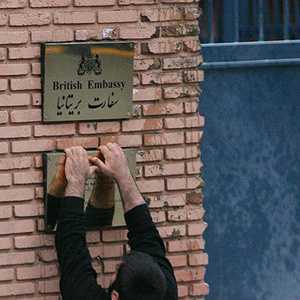Tehran-London Struggle and Its Impact on Nuclear Negotiations
By Shamsoddin Khareghani, Iran’s former ambassador to Germany.

It is not the first time Iranian officials grapple with the idea of reducing the level of relations with the United Kingdom. In the late 1980s, at the time of Hashemi Rafsanjani presidency, the parliament made a similar decision that finally led to a breakup with Britain. Imam Khomeini fatwa (religious decree) against Salman Rushdi and his Satanic Verses had angered the British. London urged other European countries to put Iran under the pressure over the fatwa. After a period of tension, Tehran and London finally severed relations. Diplomatic efforts of the Iranian foreign ministry led to resumption of ties at the level of chargé d’affaires. Those days seem to be coming back as the eighth Iranian parliament is contemplating on issuing a bill which obliges the government to limit relations with London.
The foreign ministry seems to agree parliament’s approach in exhibiting a tough gesture towards the United Kingdom. London, on the other hand, doesn’t seem to be worried at all, as EU and Five plus One are pressurizing Iran. It seems that radical forces on both sides are fomenting tensions to achieve their goal, that is a breakup in Iran-Britain relations. Nevertheless, history shows that economic ties between the two countries have never been influenced by diplomatic relations, despite what some political actors in Tehran believe. I believe that downgrading relations is not the solution to problems between the two countries. We should think of other ways before things reach the point of no return.
Meanwhile, tensions in Tehran-London ties will not have a direct impact on Iran’s nuclear case. Six countries are the parties to nuclear negotiations with Iran, each with its own interests, and it doesn’t seem that other members would be ready to sacrifice their national interests for Britain. The greater impact of strained ties will be on Iran’s relations with the European Union. EU members have proved to be supportive of each other when they have faced problems with Iran. The Mikonos trial and Germans’ breakup with Iran, Satanic Verses dispute and increasing pressure of European states and Czech Republic’s hosting of U.S. Radio Liberty have all attest to close relation of EU members. Looking from this angle, it seems that limiting relations with London will indirectly affect the nuclear case as EU members will increase pressures on Iran. Let’s not forget that EU High Representative for Foreign Affairs and Security Policy, Catherine Ashton, is a British citizen and can play an influential role in the future of Iran-EU relations.
The foreign ministry seems to agree parliament’s approach in exhibiting a tough gesture towards the United Kingdom. London, on the other hand, doesn’t seem to be worried at all, as EU and Five plus One are pressurizing Iran. It seems that radical forces on both sides are fomenting tensions to achieve their goal, that is a breakup in Iran-Britain relations. Nevertheless, history shows that economic ties between the two countries have never been influenced by diplomatic relations, despite what some political actors in Tehran believe. I believe that downgrading relations is not the solution to problems between the two countries. We should think of other ways before things reach the point of no return.
Meanwhile, tensions in Tehran-London ties will not have a direct impact on Iran’s nuclear case. Six countries are the parties to nuclear negotiations with Iran, each with its own interests, and it doesn’t seem that other members would be ready to sacrifice their national interests for Britain. The greater impact of strained ties will be on Iran’s relations with the European Union. EU members have proved to be supportive of each other when they have faced problems with Iran. The Mikonos trial and Germans’ breakup with Iran, Satanic Verses dispute and increasing pressure of European states and Czech Republic’s hosting of U.S. Radio Liberty have all attest to close relation of EU members. Looking from this angle, it seems that limiting relations with London will indirectly affect the nuclear case as EU members will increase pressures on Iran. Let’s not forget that EU High Representative for Foreign Affairs and Security Policy, Catherine Ashton, is a British citizen and can play an influential role in the future of Iran-EU relations.

